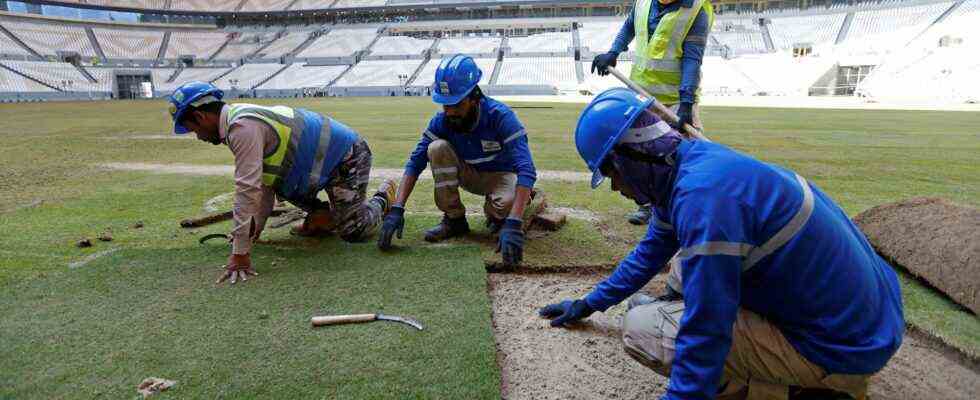Status: 11/21/2021 7:21 am
The World Cup will open in Qatar in a year. Conditions for workers have improved marginally, but there are worlds between them and the lives of rich Qataris.
A pleasant afternoon in Qatar: young, rich Qataris have fun visiting a relative; young men, part of the 300,000 people in Qatar who enjoy the prosperity to the fullest. You are looking forward to the World Cup and you have every reason to be: You will be sitting in the grandiose Lusail Stadium – with 80,000 seats, the largest of a total of eight football stadiums that Qatar is building out of the desert floor and whose completion is right on schedule, according to project managers Tamin el-Abed proudly announces. Qatar has really set standards in terms of preparation, says el-Abed.
The final of the World Cup will take place in the Lusail Stadium on December 18, 2022.
Image: REUTERS
Progress stalled
Those who set these standards, which fill the schedule with life and work, are not doing so well: According to Amnesty International, there will have been an improvement in working conditions by 2020. There is a minimum wage of the equivalent of 230 euros, only six days of hard work of eight to ten hours a day. But now there is no more progress.
Some reforms have even been withdrawn, Amnesty International criticizes in a recently published report. Now the real political will of the Qatari government is necessary in order to consistently implement the reforms that have been initiated.
Many grievances have not been overcome
Human Rights Watch’s Hiba Zayadin is also familiar with the poor conditions for the migrant workers: “They are still being exploited,” she says. “Wages are not paid, at least the money comes too late. There are problems with confiscated passports.”
The housing of the workers is free, but meager. You sleep on a bed behind a curtain. More privacy is not possible.
Without foreign workers, the construction of the World Cup stadiums in Qatar would not have been possible – but the working conditions have repeatedly been sharply criticized.
Image: REUTERS
Kafala system remains
The kafala system, which turns workers into a kind of serf to the employers, has still not been completely abolished. Employers still prevent their workers from leaving or changing jobs.
Anyone who has found work in the small, rich desert state, criticizes these living and working conditions only cautiously, or better not at all. Interviews of the ARD Studios Cairo take place in the presence of the boss. Of course, criticism is hardly to be expected. Are there any complaints about the wages? “No,” replies Babul Mondal, a young man with a helmet and a safety vest, and smiles. After all, he is the elected employee representative. Is anyone asking for more money? “No.”
Protests paint a different picture
A few months ago it was different: Hundreds of workers, mainly from Nepal, protested in Qatar’s capital Doha and demanded payment of outstanding wages.
“We are on strike,” shouted a worker who can be seen on a cell phone video. “We haven’t received any money for months, not a single day off. The drinking water is inedible.”
The young, rich Qataris are now sitting in a living room in the Majlis, the corner only for men; They drink tea and enjoy sweet desserts. The conversation revolves around a trip to Japan and the hikes you can go on there.
A year before the World Cup is staged, the different worlds in the small desert state of Qatar could hardly be further apart.
Qatar a year before the World Cup
Udo Schmidt, ARD Cairo, November 18, 2021 1:54 p.m.

